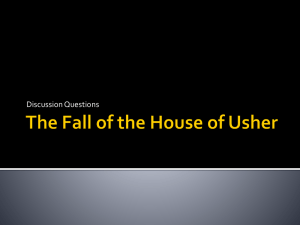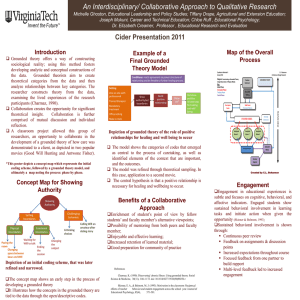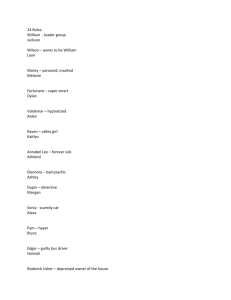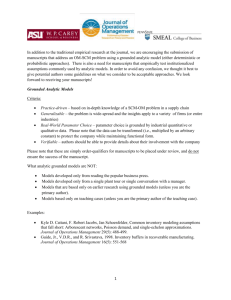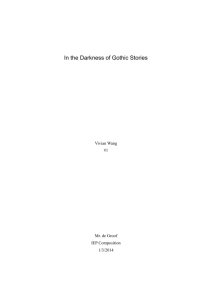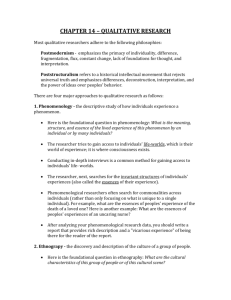Running head: GROUNDED THEORY ANALYSIS Commodifying
advertisement
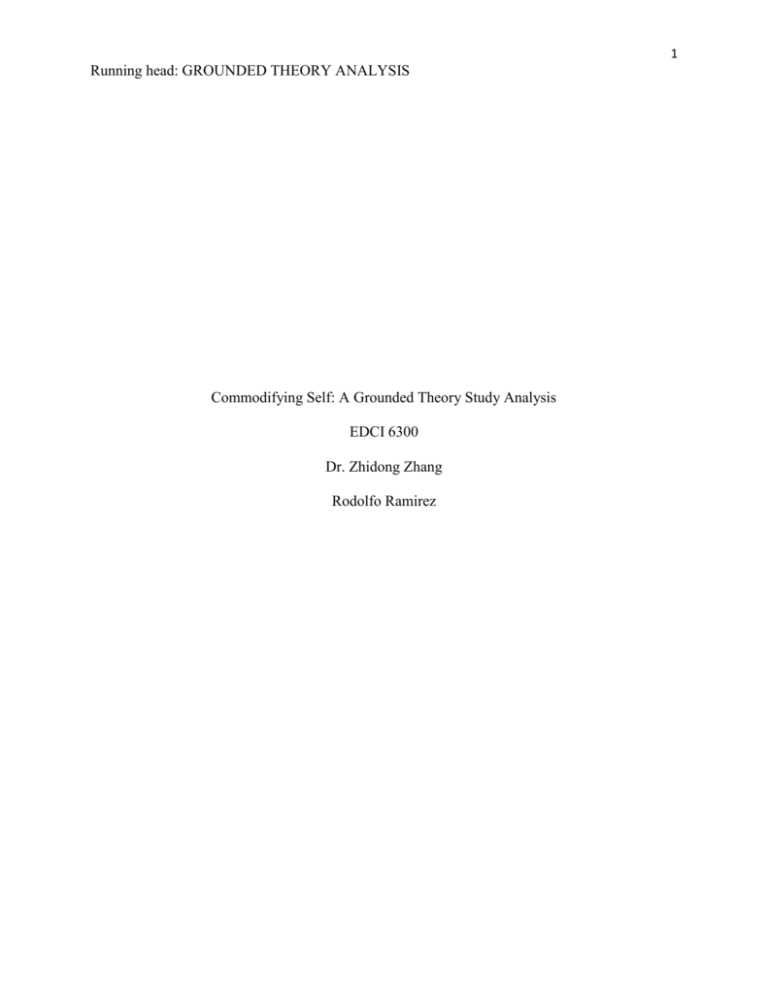
1 Running head: GROUNDED THEORY ANALYSIS Commodifying Self: A Grounded Theory Study Analysis EDCI 6300 Dr. Zhidong Zhang Rodolfo Ramirez 2 Running head: GROUNDED THEORY ANALYSIS Commodifying Self: A Grounded Theory Study Analysis Introduction Grounded Theory maintains four very important set of criteria. The criteria are as follows: fit, understanding, generality and control. The following analysis utilizes the criteria of the characteristics of grounded theory to establish whether or not Roderick’s study follows the proper methodology or not. The analysis will also determine whether Roderick makes a valid, well-supported argument considering his data. The analysis of the data and type of data used is quintessential to the validity of this study. Fit According to Johnson and Christensen, when determining whether or not a theory is valid, first the theory must fit the actual data for it to be useful (2008). Theories must correspond closely to real-world data. A flawed or invalid theory more closely relates to the author’s personal bias. Roderick’s data was compiled from interviews and the analysis of literature of past studies, but it was also derived from interviews, theoretical sampling of additional groups, field notes and memos written from data collected which Roderick completed on his own (Roderick, 2010). Roderick also look at quantitative data coming from surveys conducted by the Canadian Undergraduate Survey Consortium and the National Survey of Student Engagement, but he strayed from making any assumptions or conclusions solely on this data as he feels the validity of surveys highlighting general trends and answers nonreflecting of the concerns the study deals with are not useful or fit for use. Understanding According to Johnson and Christensen, a valid theory offers a clearly stated and readily understandable thesis. This theory should be clear to people working in the substantive area, but 3 Running head: GROUNDED THEORY ANALYSIS it should also be understandable to those who are not (2008). Roderick’s theory is clearly labeled in his article and postulates students in their senior year of undergraduate study encounter considerable pressure to commodify themselves. He also adds individuals respond to this pressure in three ways: by complying with commodification, resisting commodification, or humanizing commodification (Roderick, 2010). Although Roderick puts forth that he conducted his research without a specific theory in mind, it is quite apparent he is driven by this theoretical notion. Generality According to Johnson and Christensen, the scope of a theory should not be so specific that the theory only applies to one set of people. Also, a theory should be not only specific to a small group or a single set of groups but must be addressed at a higher conceptual level for it to be well grounded (2008). Roderick claims to have attempted to understand the core concern of graduating students and how they attempted to process or resolve this concern by directing his research towards developing and validating emerging hypotheses ceasing data collection when the theory’s variables and interrelations were saturated (2010). Already, initially Roderick opens the scope of his research and study by not restricting herself to any one single hypothesis making this study much more grounded in a wider scheme of data. Roderick also moved to the theoretical level by writing memos at a conceptual level and constantly comparing findings to zero in on the best hypotheses. Even then, Roderick continuously added new data and changed his hypothetical standing throughout his research to arrive at the best conclusion and avoiding going from the conceptual level to a lower descriptive level (Roderick, 2010). So, Roderick made a well-documented effort to try and maintain the 4 Running head: GROUNDED THEORY ANALYSIS theory and research at the wider conceptual level before turning to the specifics of the experiences he was documenting. This maintains an adequate level of generality for this theory. Although Roderick does mention the sampling in this study was limited to those who are part of the millennial generation this does not really invalidate her research or theory as it still is very useful and contributive. The research and theory is very useful to students, faculty and student affairs and services professionals, and institutional and policy stakeholders (Roderick, 2010). This already displays how the theory may, in its generality, be very useful to a large group of people which is integral to its validity as a grounded theory. Control A theory must have controllable variables. This is necessary as to allow the theorist to have some control over the phenomenon that is explained by the theory (Johnson & Christensen, 2008). In this instance, the variables are readily available across the United States at every university with graduating seniors. The social pressures Roderick mentions also constantly exist. Of course, the increase or decrease of these pressures such as the growing or suffering economy is outside of the control of the theorist, but for the most part all graduating seniors face the same variations of pressures. Amounting pressures graduating seniors face can be simulated in a test to gather research if necessary, so the theorist can maintain control of the theory. Conclusion Considering the criteria set forth for the characteristics of grounded theory, the analysis concludes this study clearly displays fitness, understandability, generality, and controllability according to what Roderick explains in this short article. Roderick utilizes a lot of qualitative data instead of quantitative data but does so with a purpose, and she really makes an effort to maintain the proper grounded-theory methodology throughout the study. 5 Running head: GROUNDED THEORY ANALYSIS References Johnson, B., & Christensen, L. B. (2008). Educational research, quantitative, qualitative, and mixed approaches. Sage Publications, Inc. Roderick, C. (2010). Commodifying self: A grounded theory study. The Grounded Theory Review, 9(1), 41-64.

